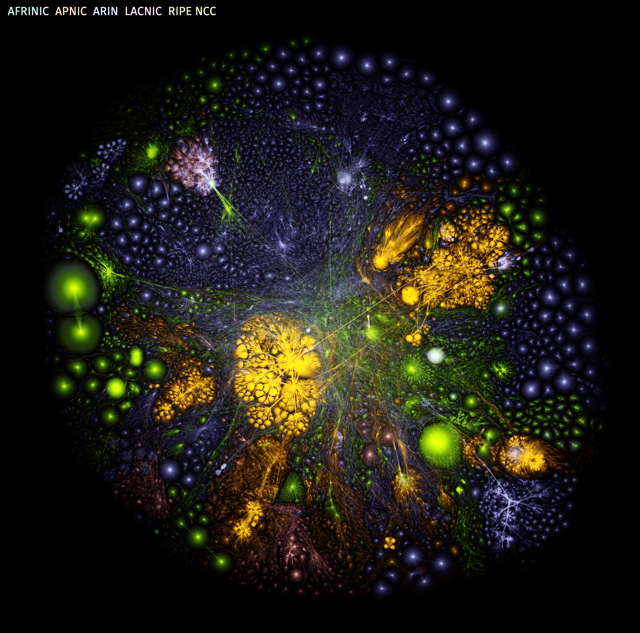Zeph & Iris map the internet: A resilient reinforcement learning approach to distributed IP route tracing
Matthieu Gouel, Kevin Vermeulen, Maxime Mouchet, Justin P. Rohrer, Olivier Fourmaux, Timur Friedman

Representation of the IP-level graph of the internet measured with Iris (credits to Maxime Mouchet).
We describe a new system for distributed tracing at the IP level of the routes that packets take through the IPv4 internet. Our Zeph algorithm coordinates route tracing efforts across agents at multiple vantage points, assigning to each agent a number of /24 destination prefixes in proportion to its probing budget and chosen according to a reinforcement learning heuristic that aims to maximize the number of multipath links discovered. Zeph runs on top of Iris, our open-source system for orchestrating internet measurements across distributed agents of heterogeneous probing capacities. We show that carefully choosing which destination prefixes to probe from which vantage point matters for optimizing topology discovery and that a system can learn to improve its assignments based on previous measurements. After 10 cycles of probing, Zeph is capable of discovering 3.3M nodes and 19.8M links in a cycle of 15 hours, when deployed on 5 Iris agents. This is 3 times more nodes and 10 times more links than the existing state-of-the-art production system for the same number of prefixes probed.
Paper on ACM library: https://dl.acm.org/doi/10.1145/3523230.3523232
Paper in Open Access: https://hal.archives-ouvertes.fr/hal-03597580/document
Iris website: https://iris.dioptra.io/#/
French adaptation presented at CoRes 2022: https://hal.archives-ouvertes.fr/hal-03656974/document
Source code of Iris: https://github.com/dioptra-io/iris
Source code of Zeph: https://github.com/dioptra-io/zeph
Source code of the evaluation section of the paper: https://github.com/dioptra-io/zeph-evaluation
@article{10.1145/3523230.3523232,
author = {Gouel, Matthieu and Vermeulen, Kevin and Mouchet, Maxime and Rohrer, Justin P. and Fourmaux, Olivier and Friedman, Timur},
title = {Zeph & Iris Map the Internet: A Resilient Reinforcement Learning Approach to Distributed IP Route Tracing},
year = {2022},
issue_date = {January 2022},
publisher = {Association for Computing Machinery},
address = {New York, NY, USA},
volume = {52},
number = {1},
issn = {0146-4833},
url = {https://doi.org/10.1145/3523230.3523232},
doi = {10.1145/3523230.3523232},
abstract = {We describe a new system for distributed tracing at the IP level of the routes that packets take through the IPv4 internet. Our Zeph algorithm coordinates route tracing efforts across agents at multiple vantage points, assigning to each agent a number of /24 destination prefixes in proportion to its probing budget and chosen according to a reinforcement learning heuristic that aims to maximize the number of multipath links discovered. Zeph runs on top of Iris, our fault tolerant system for orchestrating internet measurements across distributed agents of heterogeneous probing capacities. Iris is built around third party free open source software and modern containerization technology, thereby presenting a new model for assembling a resilient and maintainable internet measurement architecture. We show that carefully choosing the destinations to probe from which vantage point matters to optimize topology discovery and that a system can learn which assignment will maximize the overall discovery based on previous measurements. After 10 cycles of probing, Zeph is capable of discovering 2.4M nodes and 10M links in a cycle of 6 hours, when deployed on 5 Iris agents. This is at least 2 times more nodes and 5 times more links than other production systems for the same number of prefixes probed.},
journal = {SIGCOMM Comput. Commun. Rev.},
month = {mar},
pages = {2–9},
numpages = {8},
keywords = {active internet measurements, internet topology}
}